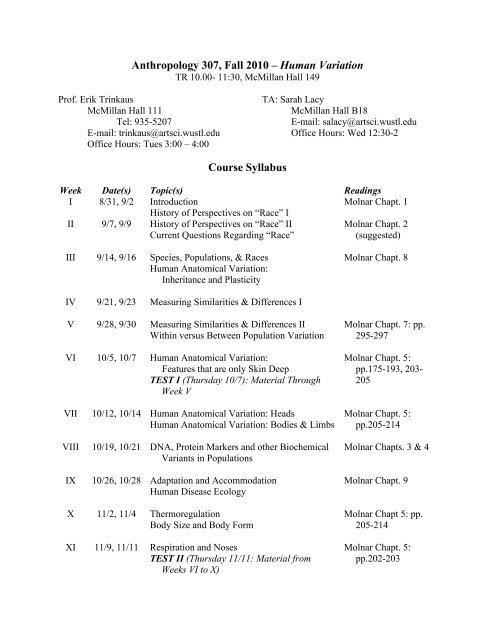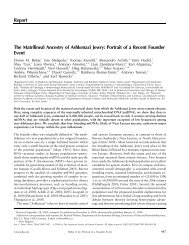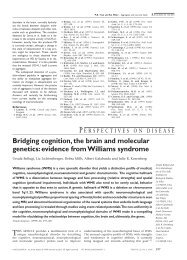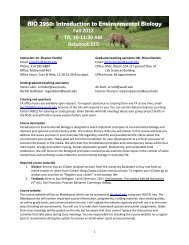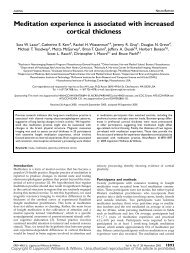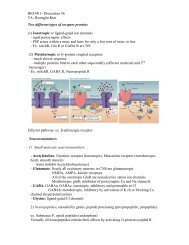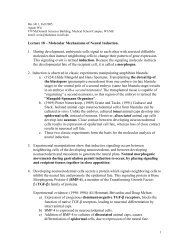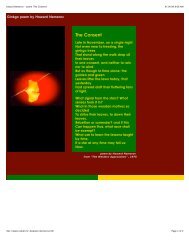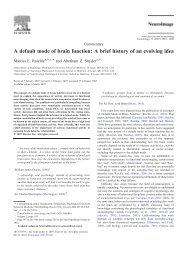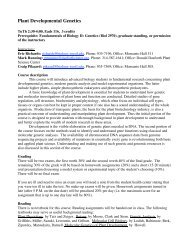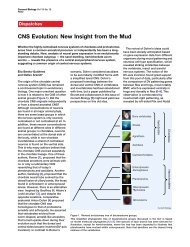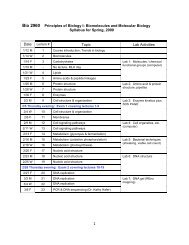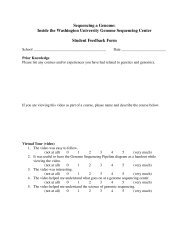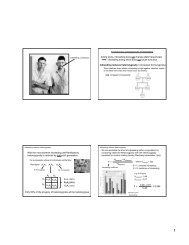Anthropology 307, Fall 2010 â Human Variation Course Syllabus
Anthropology 307, Fall 2010 â Human Variation Course Syllabus
Anthropology 307, Fall 2010 â Human Variation Course Syllabus
You also want an ePaper? Increase the reach of your titles
YUMPU automatically turns print PDFs into web optimized ePapers that Google loves.
<strong>Anthropology</strong> <strong>307</strong>, <strong>Fall</strong> <strong>2010</strong> – <strong>Human</strong> <strong>Variation</strong><br />
TR 10.00- 11:30, McMillan Hall 149<br />
Prof. Erik Trinkaus<br />
TA: Sarah Lacy<br />
McMillan Hall 111<br />
McMillan Hall B18<br />
Tel: 935-5207<br />
E-mail: salacy@artsci.wustl.edu<br />
E-mail: trinkaus@artsci.wustl.edu Office Hours: Wed 12:30-2<br />
Office Hours: Tues 3:00 – 4:00<br />
<strong>Course</strong> <strong>Syllabus</strong><br />
Week Date(s) Topic(s) Readings<br />
I 8/31, 9/2 Introduction<br />
Molnar Chapt. 1<br />
History of Perspectives on “Race” I<br />
II 9/7, 9/9 History of Perspectives on “Race” II<br />
Current Questions Regarding “Race”<br />
Molnar Chapt. 2<br />
(suggested)<br />
III 9/14, 9/16 Species, Populations, & Races<br />
<strong>Human</strong> Anatomical <strong>Variation</strong>:<br />
Inheritance and Plasticity<br />
Molnar Chapt. 8<br />
IV 9/21, 9/23 Measuring Similarities & Differences I<br />
V 9/28, 9/30 Measuring Similarities & Differences II<br />
Within versus Between Population <strong>Variation</strong><br />
VI 10/5, 10/7 <strong>Human</strong> Anatomical <strong>Variation</strong>:<br />
Features that are only Skin Deep<br />
TEST I (Thursday 10/7): Material Through<br />
Week V<br />
Molnar Chapt. 7: pp.<br />
295-297<br />
Molnar Chapt. 5:<br />
pp.175-193, 203-<br />
205<br />
VII<br />
VIII<br />
IX<br />
10/12, 10/14 <strong>Human</strong> Anatomical <strong>Variation</strong>: Heads<br />
<strong>Human</strong> Anatomical <strong>Variation</strong>: Bodies & Limbs<br />
10/19, 10/21 DNA, Protein Markers and other Biochemical<br />
Variants in Populations<br />
10/26, 10/28 Adaptation and Accommodation<br />
<strong>Human</strong> Disease Ecology<br />
Molnar Chapt. 5:<br />
pp.205-214<br />
Molnar Chapts. 3 & 4<br />
Molnar Chapt. 9<br />
X 11/2, 11/4 Thermoregulation<br />
Body Size and Body Form<br />
XI 11/9, 11/11 Respiration and Noses<br />
TEST II (Thursday 11/11: Material from<br />
Weeks VI to X)<br />
Molnar Chapt 5: pp.<br />
205-214<br />
Molnar Chapt. 5:<br />
pp.202-203
XII<br />
11/16, 11/18 Skin Pigmentation & Solar Radiation<br />
Adjustments to Environment: Growth<br />
Molnar Chapt 5: pp.<br />
176-193; Chapt. 6<br />
XIII 11/23 Adjustments to High Altitude<br />
Thanksgiving<br />
Molnar Chapt. 6<br />
XIV 11/30, 12/2 Adjustments to Environmental Richness: IQ Molnar Chapt.7<br />
XV 12/7, 12/9 The Origins of Modern <strong>Human</strong> <strong>Variation</strong><br />
12/21 Final Exam (6:00-8:00 PM):<br />
Weeks XI to XV, and Comprehensive<br />
Readings:<br />
The readings are in one textbook plus a couple of articles. The articles will be emailed as<br />
pdfs at the appropriate time.<br />
Molnar, S. (2006) <strong>Human</strong> <strong>Variation</strong>, 6th ed. Prentice-Hall.<br />
The chapters or pages are indicated with each week’s topics. Note that some pages are repeated,<br />
since they apply to more than one lecture topic. Not all of the topics covered in the readings will<br />
be covered in lecture, and not all of the lecture topics have associated readings.<br />
Requirements:<br />
There will be two in-class exams and a final exam. The exams will be based primarily on<br />
the material from the lectures, but they will be supplemented by material in the readings. The<br />
first exam will cover the material from the first five weeks, and the second exam will cover the<br />
material from weeks VI to X. The final exam will both cover the material from the remaining<br />
weeks of the semester (XI to XV) and have a short section covering important general concepts<br />
from the entire semester. The percentage distribution of the exams for the final grade will be<br />
30%, 30%, 30% and 10% (the last for the comprehensive section of the final exam).<br />
It is assumed that you already have a knowledge of the basic mechanics and processes of<br />
genetics and evolution (<strong>Anthropology</strong> 150 or Biology equivalent), although key issues will be<br />
mentioned and the background chapter in Molnar (Chapter 2) provides much of this information<br />
and is included among the early readings. The textbook contains technical details regarding<br />
especially human genetics. You will be responsible for the key concepts and issues, but not for<br />
all of the technical details, unless they are mentioned in lecture.<br />
<strong>Course</strong> Mechanics:<br />
Additional readings, handouts (Powerpoints), and other materials will be uploaded to<br />
Telesis for the course.
In-Class Decorum<br />
Based on recent experience in lecture courses, a few aspects of proper behavior during<br />
lecture need (unfortunately) to be mentioned. All of these aspects should be self-evident, but<br />
experience has shown otherwise.<br />
Expect to remain seated in class during the entire lecture. Trips to the restroom or<br />
elsewhere during class are disruptive, insulting the lecturer, and discourteous to the class. If you<br />
have a medical problem that requires absence during class, please sit near the door and let us<br />
know about it at the beginning of the semester. Students leaving during class will not be<br />
readmitted to the lecture hall.<br />
If you need to be leave early for a legitimate reason, please sit next to the door and leave<br />
discretely when needed.<br />
It should not need to mentioned that cell phone use (including texting), reading materials<br />
other than checking notes or the text, etc. during class is disrespectful. Students doing so will be<br />
asked to leave.<br />
You are welcome to use a labtop computer to take notes or annotate Powerpoint files that<br />
will be distributed at times during the semester. Please do not use the computer for other<br />
purposes, since rapidly changing images on the screen are distracting to other students.<br />
Try to remember to turn your cell-phone off before lecture starts. If it should ring, please<br />
turn it off as quickly as possible.


